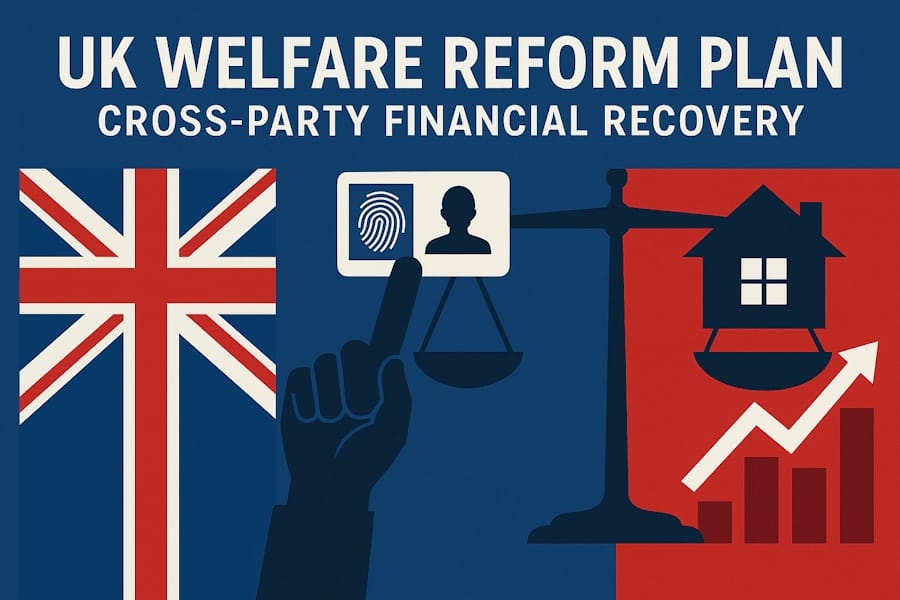Type: Article -> Category: UK Politics
UK A Nation at the Crossroads
A Cross-Party Blueprint to Reform Welfare and Rescue Britain's Finances

Publish Date: Last Updated: 12th January 2026
Author: nick smith- With the help of CHATGPT
Prologue: How AI Helped Build This Vision for Change
This article is more than just a proposal for UK welfare reform. It is also a real-world example of how artificial intelligence, when used thoughtfully, can contribute to solving complex national challenges.
As the author, I collaborated with OpenAI’s ChatGPT & GROK to refine data, clarify policy, and develop a long-form, cross-party blueprint aimed at helping Britain recover from its current financial crisis. What began as a research draft became, through structured AI support, a fully developed article integrating economic modeling, policy comparisons, ethical analysis, and political strategy.
This wasn’t AI replacing human thought—it was AI enhancing it. It served as a co-writer, policy assistant, and sounding board, helping me think more critically, structure my ideas clearly, and balance compassion with practicality.
In a time when AI often makes headlines for disruption or fear, I hope this piece shows another path—how AI can empower individuals, elevate national debate, and help craft solutions that are too important to leave to partisanship or procrastination.
This is the kind of AI Britain—and the world—needs: practical, collaborative, and purpose-driven.
Let’s use it wisely.
Introduction
In 2025, the United Kingdom stands at a fiscal and social crossroads. With national debt nearing 96% of GDP and the welfare bill climbing toward £300 billion annually, the question confronting Britain is no longer whether reform is necessary—but whether we can summon the political will to do it fairly, boldly, and together.
This isn’t just about spreadsheets or savings. It’s about restoring trust in a system designed to support—not trap—the British people. It's about moving from crisis management to national renewal. And to do that, the UK must build a welfare model for the 21st century—one that balances compassion with accountability, and security with contribution.
This is a call for a cross-party consensus, grounded in reality and ethics, to rescue Britain’s finances and restore a sense of fairness, dignity, and shared responsibility.
The Challenge We Face
Britain’s welfare state was built on the noble principles of post-war reconstruction: collective responsibility, social safety, and universal dignity. But decades of population growth, economic shocks, housing pressures, and policy drift have left the system overextended and underperforming.
- Debt: At 96% of GDP, the UK’s debt burden constrains spending, crowds out investment, and threatens long-term stability.
- Welfare Costs: Nearly £300 billion per year is spent on benefits—equivalent to over £4,300 per citizen.
- Economic Inactivity: Over 9.4 million working-age adults are now economically inactive, many stuck in long-term dependency with limited support toward reintegration.
- Housing Pressures: £30 billion is spent annually on housing subsidies, yet cities are short of key workers and social housing is often decoupled from contribution or community need.
- Fraud & Error: Welfare fraud and error cost the taxpayer £8.3 billion annually, with minimal enforcement capacity.
The status quo is not only unsustainable—it is morally and fiscally negligent.
Reimagining the Welfare Contract
To reform welfare in a way that commands public confidence and economic credibility, Britain must rebuild its social contract on five principles:
- Support must be linked to effort—not entitlement alone.
- Protection must be guaranteed—for the vulnerable, elderly, and disabled.
- Technology must serve fairness, not bureaucracy or exclusion.
- Contribution must be rewarded, not penalised.
- Reform must be cross-party, to ensure long-term public legitimacy.
Policy Pillars for Reform
1. In-Person Verification & Biometric Integrity
Policy: All new or high-risk claimants (e.g., Universal Credit, disability benefits) must undergo in-person verification with biometric data (e.g., fingerprints, facial ID), linked to the NHS or passport system.
Pilot: 10 DWP offices in high-fraud areas (e.g., London, Birmingham) by 2026, scaling to 50 nationwide by 2028. 100 mobile units deployed for rural/elderly access.
Impact:
- Save up to £1.6 billion/year by cutting fraud and error.
- Discourage false claims and help redirect resources to those truly in need.
- Increase public confidence and transparency.
Ethical Safeguards:
- Full GDPR compliance.
- Independent appeals process.
- Vulnerable groups (elderly, severely disabled) exempted automatically.
- Public awareness campaign: “Fair Welfare: Fair for Everyone.”
2. Linking Housing to Employment Contribution
Policy:
- Guarantee social housing for employed individuals, with priority for NHS staff, teachers, and key workers in cities.
- For long-term unemployed: 6-month grace period before relocation to:
- Boarding houses (for singles, £5,000/year).
- Mobile homes (for families, £7,000/year) with job-seeking conditions.
Implementation:
- Reallocate 10% of council housing (400,000 units) to key workers by 2029.
- Build 10,000 boarding units and 10,000 mobile homes using public land.
- Pilot relocations in Manchester and Leeds.
- Invest £1 billion in rural job creation and £2 billion in skills training.
Outcome:
- Save £5–8 billion annually in housing costs.
- Free up urban housing for productive residents.
- Rebalance regional economies and stimulate underused communities.
Mitigation:
- £200 million in annual subsidies for affected families.
- 100,000 new homes built by 2029 to avoid shortages.
- Danish-style compliance model: 12-month benefit cap, 50% cut for refusal to participate.
3. Investing in Work and Skills
Action Plan:
- £2 billion to retrain 200,000 benefit claimants in key sectors (care, green energy, logistics, digital).
- £1 billion in rural job creation, linked to relocated housing.
- Leverage foreign investment via tax incentives (Ireland’s FDI model).
Result:
- 500,000 new workers = £4 billion in additional tax revenue and 0.5% GDP growth.
- Sustainable employment reduces long-term welfare dependency.
- Restores dignity through meaningful contribution.
Building a Cross-Party National Mission
The scale and sensitivity of this reform require parliamentary cooperation, not tribalism.
We propose:
- A Joint Parliamentary Welfare Reform Commission by Q1 2026.
- Advisory input from businesses, unions, charities, local authorities, and economists.
- Regular public reporting and citizen consultation.
This is how Sweden and Canada achieved success—by insulating serious reform from short-term political pressures. Britain must do the same.
Comparing the World: Lessons from Elsewhere
- Sweden: Cut its debt from 70% to 50% (1995–2000) by tightening welfare access and increasing work incentives.
- Canada: Reduced debt from 70% to 30% over a decade by welfare rationalisation, job training, and cross-party budgeting.
- Germany: Introduced “Hartz reforms” that were unpopular—but contributed to long-term economic resilience.
Ethical Accountability in the AI Age
Technology can improve efficiency, but it must be guided by human values:
- All AI decision systems (e.g., fraud detection) must be audited for bias and subject to appeal.
- Biometric data must be encrypted, independently governed, and destroyed on expiry.
- Use open-source algorithms where possible to ensure transparency.
This isn’t about punishing the poor. It’s about protecting public services for those who need them most.
What This Means for You
| Group | Impact |
|---|---|
| Pensioners | No impact. Pensions preserved. Peace of mind. |
| Key Workers | Priority housing. Urban access. Lower commute costs. |
| Job Seekers | Training and support—but with clear conditions. |
| Genuine Claimants | Faster help, fewer delays, more trust. |
| Fraudsters | Less room to exploit. Stronger enforcement. |
| Taxpayers | £12–15 billion in annual savings. Greater accountability. |
Conclusion: A New Welfare for a New Britain
Britain’s welfare system must not be dismantled—it must be rebuilt.
It must honour its founding ideals while adapting to a world of longer lifespans, tighter finances, and faster change. That means helping people not just survive—but thrive. We don’t need more division—we need more dignity.
If we act now—with courage, care, and consensus—we can not only fix our welfare system but restore Britain’s sense of shared purpose.
Let this be the moment we chose reform over rot, unity over delay, and dignity over dependency.
Latest UK Politics Articles
AI Questions and Answers section for UK Welfare Reform Plan: A Cross-Party Blueprint to Fix Britain’s Finances
Welcome to a new feature where you can interact with our AI called Jeannie. You can ask her anything relating to this article. If this feature is available, you should see a small genie lamp above this text. Click on the lamp to start a chat or view the following questions that Jeannie has answered relating to UK Welfare Reform Plan: A Cross-Party Blueprint to Fix Britain’s Finances.
Be the first to ask our Jeannie AI a question about this article
Look for the gold latern at the bottom right of your screen and click on it to enable Jeannie AI Chat.
Type: Article -> Category: UK Politics










